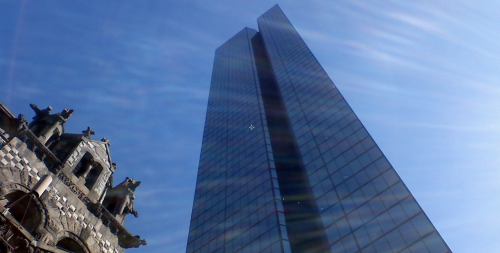Good riddance! That was my reaction to news that State Rep. Martha “Marty” Walz (D – Boston) was announcing the intention to resign from her seat on Beacon Hill. Walz made the announcement on Jan. 30, but she doesn’t seek to go out quietly.
Marty Walz – who will become the president of two Planned Parenthood organizations in Massachusetts, as well as the CEO of one – has vowed to squelch Boston’s growth. According to the Banker and Tradesman, Walz has filed one last piece of legislation for Beacon Hill to vote on: a bill which proposes new buildings cannot cast shadows on six Boston parks.
Walz is no stranger to such obstructionist laws, and in 2011 she introduced similar legislation, Bill H.1169. The bill proposed that no new construction would be allowed should it potentially cast a shadow on parks such as the Commonwealth Ave. Mall and Copley Square Plaza. Such legislation would effectively gut any significant project in the designated ‘Back Bay High Spine,’ an area explicitly zoned for lofty developments in Boston.
While her alleged intentions are admirable to some, the effects are far too detrimental to Boston’s growth and residents. With yet another major hurdle for new development, Boston’s already constrained housing supply and high rental rates will only be further exacerbated. This is great for those wealthy enough to own and rent out property in Boston (the same people who I suspect are most likely in their district to get out and vote for a State Representative,) but a huge blow to the working and middle class residents of Boston.
It is no secret that building in Boston frequently requires developers to go vertical in order to turn a profit. In seeking profit, developers expand the supply of apartments, offices, and hotel rooms, thus driving down rents. Many projects have fizzled out entirely due to Boston’s already restrictive laws on new development, with height restrictions principal amongst them. The effects are obvious, and Boston is consistently criticized for its high cost of living.
A special election date has been set for June 25, and the race is already starting to take shape. The favorite thus far in the race appears to be one of Suffolk’s own: alumnus Nils Tracy, a resident of Beacon Hill who obtained a Juris Doctorate degree from Suffolk University. Tracy said in a statement, “We have to deal with rent inflation,” which signals to me that he may not be up for the same games as Walz.
Until it comes time to choose a new representative, however, we must ensure that Walz’s last piece of legislation is firmly voted down. Should the bill come to pass, I assure you that development in Boston will fall even further behind demand. Rents will continue to climb, inequality will continue to grow, and our city’s health will be at stake.
I bid you farewell, Marty Walz. May you never have a say in city development again, for you have shown little understanding of its mechanics. Lest I forget, please take fellow-obstructionist Rep. Byron Rushing with you on the way out.









A.P. Blake • Feb 14, 2013 at 12:21 am
@alexdpratt Click the link. And then another link. And that’s all the links you click. Or just click this link: http://t.co/ZyAELwjP LINK!
Eric Wildman • Feb 13, 2013 at 8:53 pm
RT: @BostonUrbEx: RT @SuffolkJournal: [Op/Ed] Walz to step down, introduces a bill to further delay city development: http://t.co/6jxJXuPC
Eric Wildman • Feb 13, 2013 at 8:53 pm
RT: @BostonUrbEx: RT @SuffolkJournal: [Op/Ed] Walz to step down, introduces a bill to further delay city development: http://t.co/6jxJXuPC
Peter • Feb 13, 2013 at 8:02 pm
RT @BostonUrbEx: RT @SuffolkJournal: [Op/Ed] Walz to step down, introduces a bill to further delay city development: http://t.co/zyxwxeHa @universalhub
John C Berg • Feb 13, 2013 at 8:01 pm
This story shows a basic misunderstanding of Boston’s development history. The “high spine” concept is the cause of inflated rents, not a cure for the problem. The vast majority of Back Bay high rises are offices, not housing- and housing was demolished and residents evicted in order to build them. We don’t need more high-rise office buildings, and we certainly don’t need to destroy our parks to build them.
A.P. Blake • Feb 13, 2013 at 9:58 pm
Professor Berg, I think perhaps my mention of the high spine was unnecessary, as this effects many areas of Boston. But the point does still stand. The tallest residential tower in New England was recently permitted to be built in the high spine (Copley Place). One of the most recent major additions was also residential (The Clarendon). I agree we don’t “need” more offices (but does it really hurt to drive down office rents? more jobs!), but the high spine is not strictly office space.
Also, I’m not positive, but I believe Christopher Columbus Park and certain Greenway parcels are included in the list of parks which shadows cannot be cast upon. This could potentially put some downtown development in a bind as well. Post Office Square is one of the greatest gems in the city, and I think we can all rest assured that shadows are “destroying” that park.
A.P. Blake • Feb 13, 2013 at 10:18 pm
That should read “are not”. Shadows are not destroying PO Sq.
GHC • Feb 14, 2013 at 7:41 am
I’m sure the residents of the high spine were upset to be evicted from the train tracks they were illegally living in. Your “facts” about the high spine are blatant lies. There has never been housing along most of the high spine. The high spine is late 19th century landfill originally populated with train tracks and highways. Both the Prudential and Copley Place developments, in particular, were air rights projects. Etpven liberty square was a train station before it became a mid-rise hotel and office buildings. The only exception to this is the stretch between Copley Square and the Public Garden, which, according to the early 20th century city planning maps was low-rise commercial.
Indeed, the high spine did in fact save the South End from redevelopment a decade before it was considered as a historic district. You can still see the legacy of that pre-preservation time along many streets South of Appleton.
A.P. Blake • Feb 13, 2013 at 8:00 pm
RT @SuffolkJournal: [Op/Ed] Walz to step down, introduces a bill to further delay city development: http://t.co/zyxwxeHa @universalhub
The Suffolk Journal • Feb 13, 2013 at 7:45 pm
[Op/Ed] Walz to step down, introduces a bill to further delay city development: http://t.co/36rZ3f5U @universalhub